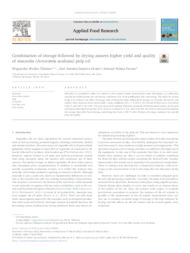Combination of storage followed by drying assures higher yield and quality of macauba ( Acrocomia aculeata ) pulp oil.
Combination of storage followed by drying assures higher yield and quality of macauba ( Acrocomia aculeata ) pulp oil.
Author(s): TILAHUN, W. W.; GROSSI, J. A. S.; FAVARO, S. P.
Summary: Macauba is a productive palm tree species in the tropical biome, and presents some advantages, as cultivation suitable for lands outside the rain forests, and lower rate of oil acidification after harvesting. The objective of this study is to evaluate the effect of storage time of macauba fruits, followed by drying, on the pulp oil content and quality. Ripe macauba fruits stored under room conditions (23 ± 1 ºC) for 0, 10, 20 and 30 days were oven dried at 60 °C and 100 °C for 24 h. The control was left undried. Physical, chemical and biochemical aspects of the pulp and physicochemical properties of its oil were evaluated. It was observed that oil content increased throughout the storage time after fruits drying, and drying the fruit at 100 °C after 30 days of storage optimizes the overall pulp oil quality.
Publication year: 2022
Types of publication: Journal article
Unit: Embrapa Agroenergy
Keywords: Acrocomia Aculeata, Free fatty acid, Oil quality, Oven drying, Pulp
Observation
Some of Embrapa's publications are published as ePub files. To read them, use or download one of the following free software options to your computer or mobile device. Android: Google Play Books; IOS: iBooks; Windows and Linux: Calibre.
Access other publications
Access the Agricultural Research Database (BDPA) to consult Embrapa's full library collection and records.
Visit Embrapa Bookstore to purchase books and other publications sold by Embrapa.

